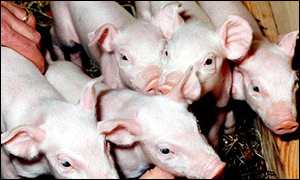
Pig cloning advance
URL: http://news.bbc.co.uk/hi/english/sci/tech/newsid_1272000/1272655.stm
Date accessed: 24 May 2001
BBC News
Wednesday, 11 April, 2001, 18:01 GMT 19:01 UK
The Scottish-based company that created Dolly the sheep has now produced a litter of five transgenic cloned pigs.
PPL Therapeutics says the work is another step towards producing pigs whose organs could be transplanted into humans.
The company, which worked with the Roslin Institute on Dolly, the first cloned adult mammal, says all five piglets are healthy.
They are not the first cloned pigs - a previous litter was born last year . But they are the first pig clones to have a foreign gene added to the cells from which they were developed.
The success, so far, of this procedure is encouraging the researchers to believe they may eventually be able to engineer pigs whose organs will not be rejected if they are transplanted into human patients.
Ethical difficulties
Pigs are among the species favoured for such procedures. Their organs are a similar size to those of people, they are quite easy to breed, and their use in scientific and medical procedures does not produce the outcry that is aroused by experiments on our closest relatives, apes and monkeys.
Pig heart valves are already used to replace faulty human ones, although rejection can be a problem. But any cross-species organ transplants that might one day be possible are some way into the future, with technical and ethical difficulties to be overcome.
The few cloned animals that have been produced so far tend to be unusually big, to age prematurely, and to have other defects in their development.
There is also concern that transplanting animal organs into humans could introduce new viruses that might be harmless in the original species but dangerous to us.
Category: 33. Cloning